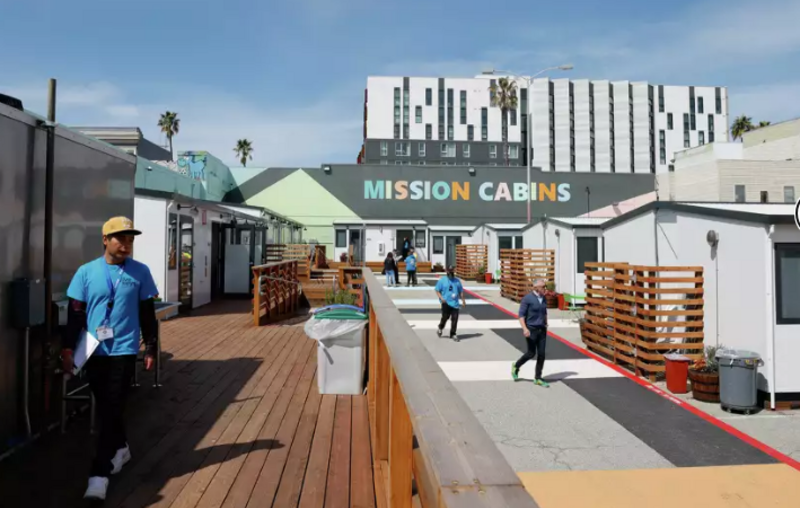by Maggie Angst and Aldo Toledo at sfchronicle.com
A much anticipated tiny cabin village for homeless people is finally open in San Francisco’s Mission District after years of planning, delays and intense controversy over the project’s steep price tag.
As of Tuesday, 10 unhoused people had moved into the village, located near the BART 16th Street Station, with plans to welcome an additional five people each day until all 60 cabins are occupied, according to Emily Cohen, spokesperson for the Department of Homelessness and Supportive Housing.
The village at 1979 Mission St., which is San Francisco’s second tiny home site, is only expected to last about two years, before developers break ground on an affordable housing project at the site. That’s despite an eye-popping price tag of about $113,000 for each cabin, when taking into account the cost of a community room and management offices.
Cities such as Oakland and San Jose have built tiny cabin villages for a fraction of that cost in recent years, prompting critics to question why public projects — from tiny homes to trash cans to toilets — seem to cost so much in San Francisco. The city will spend an additional $2.9 million a year to provide services at the site.
The strife surrounding the project illustrates the difficulties San Francisco faces in trying to expand its housing and shelter system. San Francisco has added more than 1,000 temporary shelter beds over the past six years, but city officials last year estimated it would take 6,000 new supportive housing units and shelter beds and cost more than $1 billion to end unsheltered homelessness over the next three years. Meanwhile, city officials must navigate neighborhood opposition and rising construction costs.
Controversy over homelessness and street conditions have been particularly intense in the Mission in recent years. Residents, merchants and the neighborhood’s supervisor have decried visible tents, open drug use, vending of illegal goods and other quality-of-life issues.
The high costs of the project concerned city officials and residents from the start. It also recently led leaders of a nonprofit that oversaw the much cheaper building of the city’s first tiny home village at 33 Gough St. to question whether the city should take on projects like these.
Plans for the tiny cabin village were placed on hold in early 2023 after serious backlash from community members, questions about the eye-popping price tag and concerns from Supervisor Hillary Ronen, who represents the Mission District, that the city was failing to keep the blocks around another shelter in the area free of tents, loitering, graffiti and trash.
Ronen pushed for the project to help address growing homeless encampments in her district but briefly walked back her support after community pushback. She also called the original cost estimate, about $100,000 per cabin, “insane.”
By late 2023, Ronen told the Chronicle that she was giving the project a “thumbs-up,” in part because officials assured her there would be a full-time staffer on call to handle community complaints.

